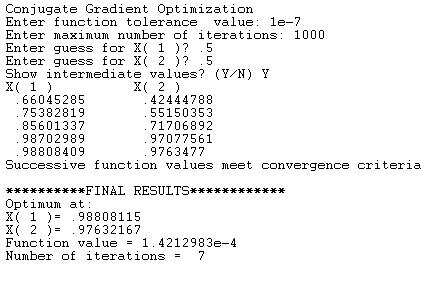
The following program calculates the minimum point of a multi-variable function using the Fletcher-Reeves conjugate gradient method.
The program prompts you to enter:
1. The function tolerance value.
2. The minimum number of iterations.
3. The initial guesses for the optimum coordinates.
The program also asks you whether or not you want to view the intermediate results.
The program displays the following final results:
1. The coordinates of the minimum value.
2. The minimum function value.
3. The number of iterations
The current code finds the minimum for the following function:
f(x1,x2) = 100 *(x1 ^ 2 - x2) ^ 2 + (1 - x1) ^ 2
Here is a sample session to solve for the optimum of the above function:

Here is the BASIC listing:
! Conjugate Gradient (Fletcher-Reeves) method
OPTION TYPO
OPTION NOLET
! Dim FTOL As Double
DECLARE NUMERIC MAX_VARS, boolRes
DECLARE NUMERIC N, I, Iters, MaxIter, F, DFNorm, DFNormOld, Lambda, LastF, EPSF
DECLARE NUMERIC bTrue, bFalse
DECLARE STRING Ans$
Dim X(1), D(1), Dold(1)
bTrue = 1
bFalse = 0
!---------------- Declare SUBs -------------------
SUB MyFx(X(), N, Res)
Res = 100 * (X(1) ^ 2 - X(2)) ^ 2 + (1 - X(1)) ^ 2
End SUB
SUB MyFxEx(N, X(), DeltaX(), Lambda, Res)
LOCAL I
Dim XX(1)
MAT ReDim XX(N)
For I = 1 To N
XX(I) = X(I) + Lambda * DeltaX(I)
Next I
CALL MyFx(XX, N, Res)
End SUB
Sub GetGradients(X(), N, Deriv(), DerivNorm)
LOCAL XX, I, H, Fp, Fm
DerivNorm = 0
For I = 1 To N
XX = X(I)
H = 0.01
If Abs(XX) > 1 Then H = H * XX
X(I) = XX + H
CALL MyFx(X, N, Fp)
X(I) = XX - H
CALL MyFx(X, N, Fm)
X(I) = XX
Deriv(I) = (Fp - Fm) / 2 / H
DerivNorm = DerivNorm + Deriv(I) ^ 2
Next I
DerivNorm = Sqr(DerivNorm)
End Sub
SUB LinSearch_DirectSearch(X(), N, Lambda, DeltaX(), InitStep, MinStep, boolRes)
LOCAL F1, F2
CALL MyFxEx(N, X, DeltaX, Lambda, F1)
Do
CALL MyFxEx(N, X, DeltaX, Lambda + InitStep, F2)
If F2 < F1 Then
F1 = F2
Lambda = Lambda + InitStep
Else
CALL MyFxEx(N, X, DeltaX, Lambda - InitStep, F2)
If F2 < F1 Then
F1 = F2
Lambda = Lambda - InitStep
Else
! reduce search step size
InitStep = InitStep / 10
End If
End If
Loop Until InitStep < MinStep
boolRes = bTrue
End SUB
!---------------------------- MAIN PROGRAM --------------------
! Conjugate Gradient (Fletcher-Reeves) method
MAX_VARS = 2
MAT REDIM X(MAX_VARS), D(MAX_VARS), Dold(MAX_VARS)
N = MAX_VARS
! Input data
PRINT "Conjugate Gradient Optimization"
INPUT PROMPT "Enter function tolerance value: ": EPSF
INPUT PROMPT "Enter maximum number of iterations: ": MaxIter
For I = 1 to N
PRINT "Enter guess for X(";I;")";
INPUT X(I)
Next I
INPUT PROMPT "Show intermediate values? (Y/N) ": Ans$
If UCASE$(Ans$[1:1]) = "Y" Then
For I = 1 To N
PRINT "X(";I;")",
Next I
PRINT
End If
! calculate and display function value at initial point
CALL MyFx(X, N, LastF)
CALL GetGradients(X, N, D, DFNorm)
Lambda = 0
CALL LinSearch_DirectSearch(X, N, Lambda, D, 0.1, 0.000001, boolRes)
If boolRes = 1 Then
For I = 1 To N
X(I) = X(I) + Lambda * D(I)
Next I
Else
PRINT "Failed linear search"
STOP
End If
Iters = 1
Do
Iters = Iters + 1
If Iters > MaxIter Then
PRINT "Reached maximum iterations limit"
Exit Do
End If
DFNormOld = DFNorm
For I = 1 To N
Dold(I) = D(I) ! save old gradient
Next I
CALL GetGradients(X, N, D, DFNorm)
For I = 1 To N
D(I) = (DFNorm / DFNormOld) ^ 2 * Dold(I) - D(I)
Next I
If DFNorm <= EPSF Then
PRINT "Gradient norm meets convergence criteria"
Exit Do
End If
Lambda = 1
CALL LinSearch_DirectSearch(X, N, Lambda, D, 0.1, 0.000001, boolRes)
If boolRes = 1 Then
For I = 1 To N
X(I) = X(I) + Lambda * D(I)
Next I
CALL MyFx(X, N, F)
If Abs(F - LastF) < EPSF Then
PRINT "Successive function values meet convergence criteria"
Exit Do
Else
LastF = F
End If
Else
PRINT "Failed linear search",
Exit Do
End If
If UCASE$(Ans$[1:1]) = "Y" Then
For I = 1 To N
PRINT X(I),
Next I
PRINT
End If
Loop
PRINT
PRINT "**********FINAL RESULTS************"
PRINT "Optimum at:"
For I = 1 To N
PRINT "X(";I;")=";X(I)
Next I
PRINT "Function value ="; LastF
PRINT "Number of iterations = ";Iters
END
Copyright (c) Namir Shammas. All rights reserved.